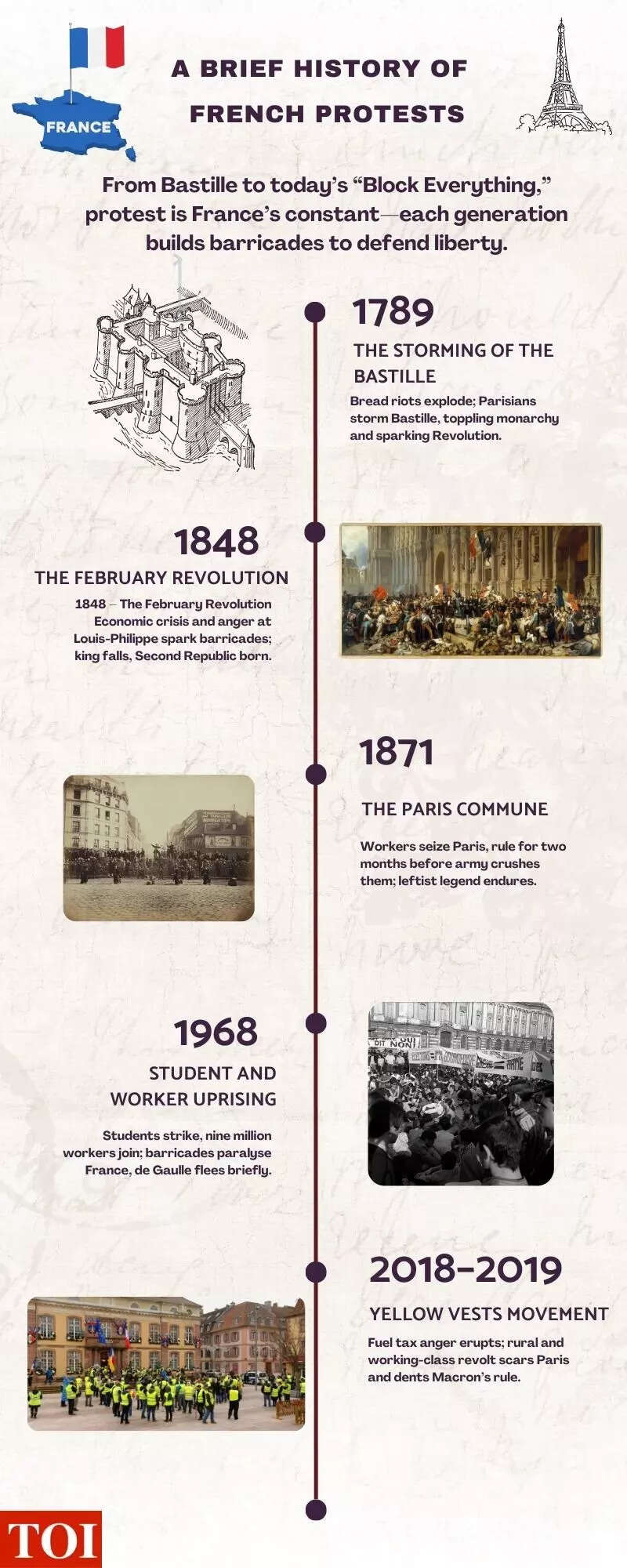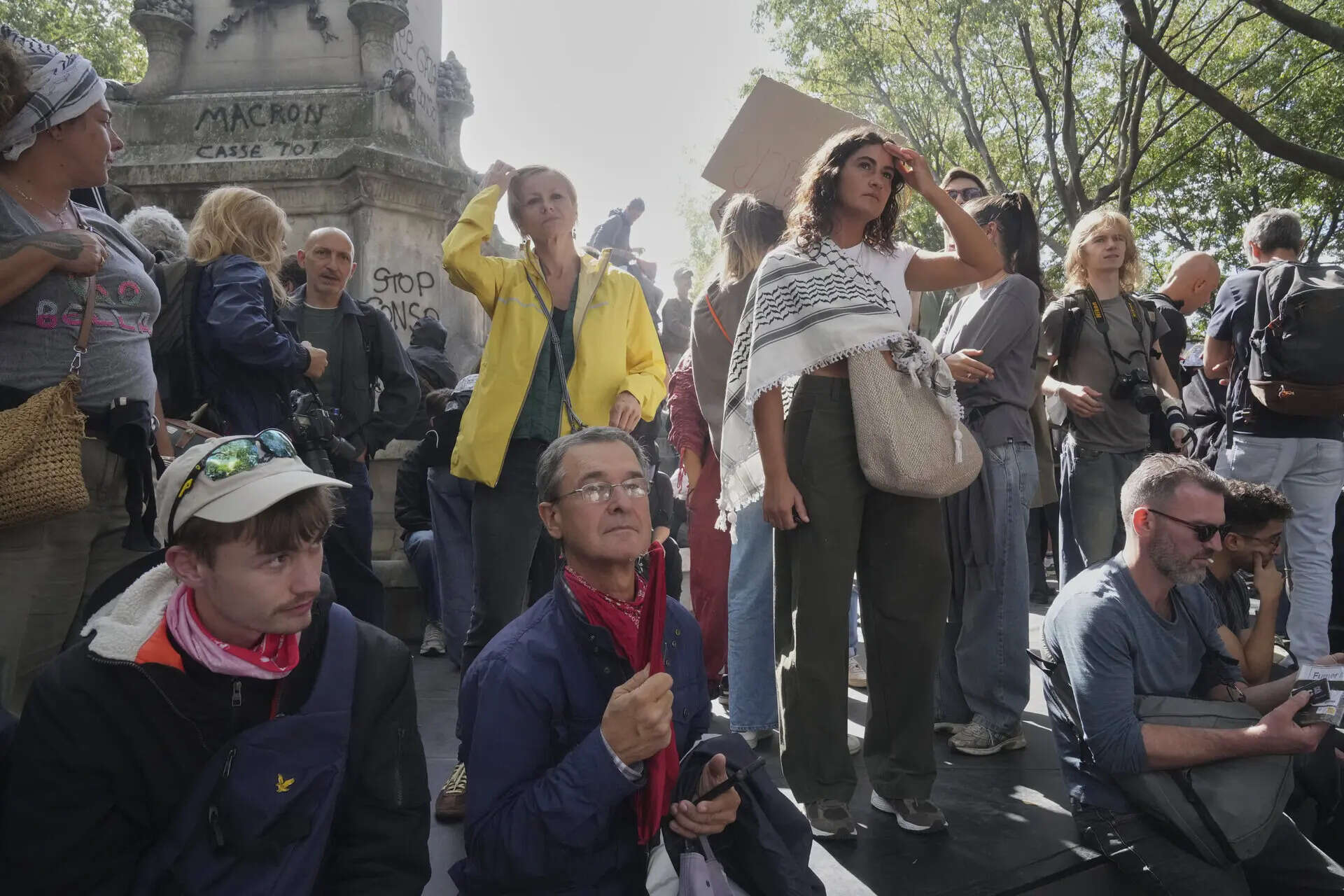“You don’t arrest Voltaire.” With that quip, French President Charles de Gaulle dismissed calls to prison thinker Jean-Paul Sartre all through the Would possibly 1968 uprisings. Even De Gaulle, architect of France’s hyper-presidential 5th Republic, knew that during his nation, revolt isn’t crime—it’s heritage. You’ll gasoline the streets, baton-charge scholars, arrest militants by way of the masses. However you’ll’t arrest the speculation of Voltaire, as a result of in France, dissent itself is sacrosanct.And right here we’re agian. This September, Paris burned, Rennes noticed a bus ablaze, trains have been halted within the southwest, and rise up police clashed with demonstrators below the banner of “Bloquons Tout”—the “Block The whole lot” motion. Over 200 arrests at the first day, regardless of Macron deploying an astonishing 80,000 police national. Inner Minister Bruno Retailleau accused the protestors of seeking to create “a local weather of rebel.” To which the French answer: Mais bien sûr.
Bayrou Falls, Macron Strucks
The rapid spark was once political. Top Minister François Bayrou, Macron’s 3rd PM in one year, gambled on an austerity price range: freezing pensions, scrapping two public vacations, slashing €44 billion in spending. He misplaced a parliamentary self assurance vote, resigned, and left Macron scrambling to put in Sébastien Lecornu, the unswerving defence minister, as France’s fourth high minister in a 12 months.If the Élysée concept this recreation of musical chairs would pacify the country, the streets begged to fluctuate. Protesters waved placards: “The autumn of the federal government is excellent, however inadequate.” Rail unions mentioned brazenly: Bayrou is also long gone, however the cuts are nonetheless coming. In Paris, they lit barricades; in Nantes, burning tires blocked roads; at Gare du Nord, 1000 attempted to typhoon the station ahead of police beat them again. By means of dusk, rubbish packing containers smouldered around the capital, commuters trudged thru tear gasoline, and Macron’s presidency appeared weaker than ever.
Freedom, equality, protest
To outsiders, French unrest seems like nationwide game. Britons queue in a well mannered way; Germans document petitions; American citizens typhoon Capitol structures as soon as a century. The French? They typhoon the whole thing, far and wide, all of sudden—palaces, prisons, rail hubs, gas depots, even tennis stadiums in the event that they will have to. From medieval charivari to Would possibly ’68, the French consider protest isn’t disruption however civic responsibility.And why no longer? Protest works right here. The 40-hour paintings week, the best to unionize, pension reforms withdrawn in 1995, pupil reforms scrapped in 2006—every carved out by way of side road fury. The lesson taught era after era is discreet: the poll field chooses rulers, however the barricade assists in keeping them fair.Victor Hugo wrote Les Misérables no longer as fiction however as civic catechism. Schoolchildren recite Los angeles Marseillaise, a countrywide anthem that exhorts them to water fields with tyrants’ blood. By the point they’re college scholars, manning barricades within the Latin Quarter feels much less like revolt than fieldwork for citizenship.So when as of late’s protesters chant towards Macron, they’re no longer deviants. They’re heirs. They’re status in a practice that runs from the Bastille to the boulevards, a family tree of rage that defines France itself.
“Let Them Devour Cake” Syndrome
The French Revolution of 1789 stays the blueprint. Bread was once scarce, taxes have been crushing, the monarchy was once decadent. Marie Antoinette, wrongly or no longer, was once forged because the clueless queen who sneered “Allow them to devour cake.” The ladies of Paris replied by way of marching to Versailles, dragging the royal circle of relatives again into the town like criminals. Days previous, the storming of the Bastille had already introduced that kings have been mortal.From that second, France locked right into a cycle: monarchy, republic, empire, repeat. Napoleon topped himself emperor in 1804, exporting progressive beliefs by way of cannon. In 1830 and once more in 1848, barricades toppled monarchs and birthed new republics—every time smothered by way of ambition, coups, or compromise. By the point the 3rd Republic (1870–1940) emerged from the ashes of Napoleon III’s defeat, revolution was once much less an match than a dependancy.Even the short-lived Paris Commune of 1871, overwhelmed in blood, lived on as mythology for each leftist and anarchist that adopted. France’s Fourth Republic (1946–1958) collapsed in chaos—16 high ministers in 12 years—till De Gaulle rode in along with his 5th Republic, promising steadiness. He delivered more potent presidents, however by no means cured the French in their oldest habit: rebellion.

Would possibly 1968: De Gaulle Meets Sartre
The archetype of recent rebellion stays Would possibly 1968. What started with scholars railing towards authoritarian universities snowballed right into a basic strike of 9 million employees. Paris was once paralysed. Barricades went up. Paving stones changed into guns. De Gaulle in short fled to an army base, not sure if his republic would live to tell the tale.It did, slightly, however the aftershocks toppled his air of mystery. When police arrested Sartre for handing out progressive leaflets, De Gaulle ordered his free up, quipping: “You don’t arrest Voltaire.” In that second he conceded what each French chief will have to: repression wins battles, however revolt owns the narrative.
Macron’s 5th Republic Headache
The 5th Republic was once intended to neuter instability by way of empowering presidents over parliaments. As a substitute, it created a gadget the place streets changed into the actual opposition. Macron exemplifies this paradox. Two times elected president, he governs with a fractured parliament: centrists unswerving most effective to survival, leftists baying for his head, Le Pen’s a ways proper circling like sharks.He’s already survived the Yellow Vest rebellion (2018–2019), which started with a gas tax however metastasized right into a motion of rural and working-class fury. Then got here 2023’s pension reform, the place Macron bypassed parliament to boost retirement age from 62 to 64—igniting months of moves and pot-banging protests. He rammed it thru, however at the price of legitimacy.Now austerity has precipitated a sequel. France’s deficit is 5.8% of GDP, debt stands at 114%, passion bills price €67 billion a 12 months. Economists call for cuts price 5% of GDP. Macron is aware of Greece survived worse. However that is France, and France doesn’t do austerity. You’ll scrap pensions in Athens; in Paris, you get barricades.Bayrou attempted. He died politically. Lecornu won’t final until Christmas. Since the anger isn’t at high ministers—it’s at Macron himself. “It’s the similar shit…it’s Macron who’s the issue, no longer the ministers. He has to head,” one protester spat. That sentiment echoes throughout banners, unions, TikTok hashtags, encrypted Telegram teams. Block The whole lot is much less motion than temper: amorphous, leaderless, viral. Exactly the type of rebellion the 5th Republic fears maximum.
Anatomy of “Block The whole lot”

Protestors accumulate all through the « Bloquons Tout » (Block The whole lot) protest motion in Paris, Wednesday, Sept. 10, 2025. (AP Photograph/Thibault Camus)
Introduced over the summer season on TikTok, X, and Telegram, Bloquons Tout requires roadblocks, moves, boycotts of Amazon and Carrefour, even financial institution runs. Its techniques mimic the Yellow Vests—decentralised, meme-driven, unimaginable to barter with. By means of day one it hadn’t paralyzed the country, nevertheless it had lit sufficient fires to paralyze Macron’s schedule.Rail strains to Charles de Gaulle Airport tousled. The RER B educate was once down. A bus in Rennes burned. Roads in Nantes smouldered. 200 arrested ahead of lunch. Air site visitors unions introduced walkouts. And within the background, Macron appeared an increasing number of like Louis XVI in a bespoke go well with.Unions odor blood. Sud-Rail declared Bayrou’s fall “excellent however inadequate.” The Socialist Birthday party warned Macron was once relationship “authentic social unrest and institutional gridlock.” Jean-Luc Mélenchon disregarded Lecornu’s appointment as contempt. Jordan Bardella mocked Macron’s “you don’t exchange a shedding workforce” vanity. France’s fractured opposition all at once sings in unison: Macron will have to pay.
The Everlasting Barricade
From Bastille to pensions, Paris to Marseille, the barricade is France’s maximum constant establishment. It outlasts republics, monarchs, and emperors. It humbles philosophers and presidents alike. Even Macron, who likes to forged himself as Jupiterian—aloof, omniscient—can’t forget about it. His Fourth Top Minister in a 12 months is evidence that Jupiter now trembles.The irony is wealthy. De Gaulle constructed the 5th Republic to save lots of France from paralysis. However its steadiness rests no longer on parliament however at the willingness of the streets to tolerate presidential vanity. And as of now, they don’t.What comes subsequent? Extra moves, indubitably. Air-traffic controllers are getting ready a 24-hour walkout. Unions plan recent rallies. The opposition smells alternative. Analysts whisper of a 6th Republic. Macron, term-limited however nonetheless presiding over chaos, dangers turning into the monarch he as soon as studied at college: Louis XVI, bewildered, questioning why the individuals are offended, whilst the mob already has the solution.
The extra it adjustments
The French don’t rise up as a result of they revel in it (regardless that some do). They rise up as a result of it’s their language of energy. Bread riots toppled monarchs, barricades birthed republics, Sartre’s pamphlets shook De Gaulle, Yellow Vests compelled Macron to retreat. To protest in France isn’t to destabilise—it’s to take part.And so buses burn, trains halt, streets choke with tear gasoline yet again. Over 200 arrested, 80,000 police deployed, but the Voltairean reality stays: you’ll’t arrest dissent. Macron can reshuffle cupboards until his ministers are dizzy. He can freeze pensions, scrap vacations, deploy cavalry. However so long as he governs with out convincing the folk, the streets will block the whole thing.In France, protest isn’t the issue. It’s the gadget’s immune reaction. And Macron, like De Gaulle ahead of him, will have to be informed the lesson anew: you’ll’t arrest Voltaire. As a result of in France, Voltaire is each protester with a banner, each pupil with a paving stone, each pensioner with a saucepan. And Voltaire at all times walks unfastened.

